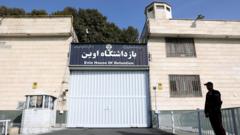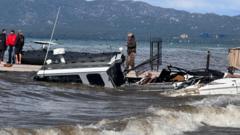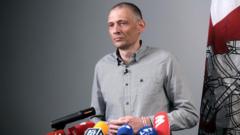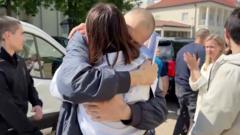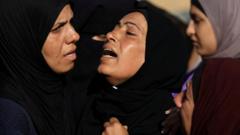Soe Nay Oo, a former imam who fled Myanmar after the 2021 coup, is grieving the loss of 170 loved ones in a recent earthquake that destroyed multiple mosques, revealing the extensive human toll on a vulnerable community facing ongoing struggles.
Grieving Imam Confronts Heartbreak After Myanmar Earthquake Claims 170 Lives
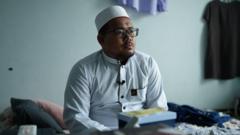
Grieving Imam Confronts Heartbreak After Myanmar Earthquake Claims 170 Lives
A former imam mourns the tragic loss of family and friends in the devastating earthquake that struck Myanmar, revealing deep emotional scars in a community already affected by turmoil.
Soe Nay Oo was an imam in Myanmar but had been working for a human rights group in Thailand after fleeing the 2021 coup. As the call to prayer rang out in Sagaing last Friday, hundreds of Muslims hurried to the five mosques in central Myanmar to participate in their last Friday prayers of Ramadan, just days before Eid, which marks the end of the holy month. Tragically, at 12:51 local time (06:21 GMT), a devastating earthquake struck the region, causing three mosques to collapse, including the largest one, Myoma, leading to a catastrophic loss of life.
Hundreds of kilometers away, in the Thai border town of Mae Sot, Soe Nay Oo felt the quake. In the following days, he learned that around 170 of his relatives, friends, and members of his former congregation perished, primarily inside the mosques. They included influential individuals in the city's closely-knit Muslim community. "I think about all the people who lost their lives, and the victims' children - some of them are young children," he expressed. "I can't hold back my tears when I talk about this."
The earthquake has claimed the lives of over 2,700 people near Sagaing and Mandalay, Myanmar's second city, with the death toll anticipated to increase as rescuers continue to recover bodies from the rubble. The area is known for its ancient Buddhist temples but has a considerable Muslim population.
According to Myanmar's leader, Min Aung Hlaing, an estimated 500 Muslims died while praying in their mosques. Eyewitnesses reported that Myoma Street, where several mosques were situated, was the most affected area, with many homes also collapsing. The aftermath has left hundreds homeless or unwilling to return to their damaged residences, with food scarcity emerging as an urgent concern.
Reports indicate that many worshippers attempted to escape as the mosques fell, as recounted by Soe Nay Oo, who has received information from surviving community members. Bodies were found in the area where worshippers performed ablutions, some clinging to each other in a desperate attempt to escape the disaster.
Among the many loved ones lost was a cousin of Soe Nay Oo's wife, whose death he described as "the most painful thing" he has faced in over a decade as an imam. "She was the one who showed her love to us the most... the loss is unbearable for us," he lamented. Other losses included a respected businessman and his former assistant imam, each remembered fondly for their unwavering support and devotion.
He shared with heartbreak how he grapples with the continuous stream of grief as reports of more casualties emerge, reflecting on the fond memories shared with those who perished during Ramadan. "All the departed have returned to Allah's home, I would say. They will be remembered as martyrs accordingly," he said.
The tragedy has been compounded by ongoing hostilities between the military junta and resistance groups, creating challenges in handling the multitude of casualties. The Muslim cemetery in Sagaing remains inaccessible, forcing the community to transport bodies to Mandalay for burial, disrupting the traditional practices of Islamic funerals.
Survivors have been coming together to assist in rescue efforts while grappling with their trauma. Despite being compelled to live away from his former congregation, Soe Nay Oo expressed feelings of survivor's guilt and a longing to support those who are suffering. "If I were the imam still, at the time of the quake, I would have gone with them," he said, reflecting on how he wishes to help those in need.
Currently, he has paused his work in Thailand to aid in the coordination of rescue efforts and provide support to the affected community. His relief comes when he receives requests for assistance, as he strives to help at least 1,000 Muslims in need in Sagaing during this critical time, encapsulating both the resilience and heartache ingrained in this tragedy.



